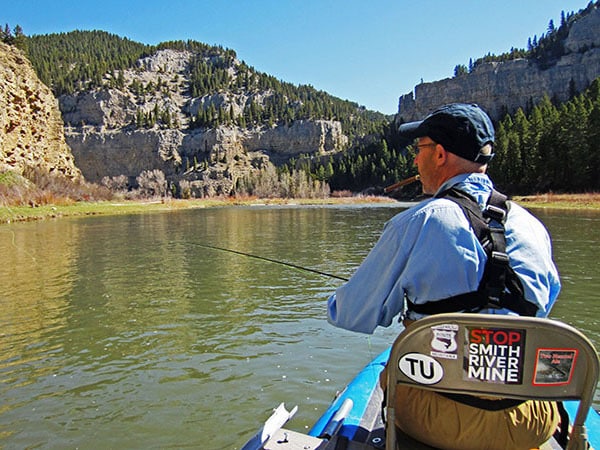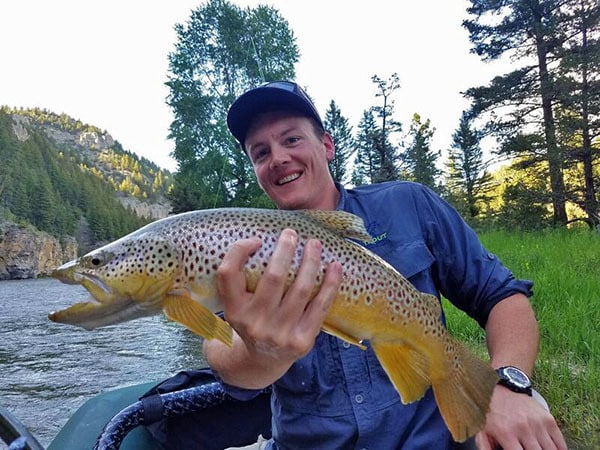The snow is all but gone in the Little Belt Mountains of central Montana, signaling that float season on the Smith River is in high gear. On the magic date of March 3rd, people learned if they drew a coveted float permit or, like myself, were sadly disappointed. The Smith River is the only river in Montana that requires a permit to float. It’s a five-day, 60-mile journey winding and bending through canyons and grasslands. With its relaxed current, the Smith is a location where beginners and experts alike can enjoy some of Montana’s best scenery and blue-ribbon trout fishing.
I had the privilege of working as a Park Ranger on the Smith River for two summers. I floated the river 11 times, checking float permits, answering questions, and making sure the river stayed pristine. Every trip brought a new and exciting experience.
One of the most exciting floats was also my last as a Ranger. The other rangers and I were about 6 miles downstream from the launch, leap-frogging each other to work more efficiently. I looked over a wildflower-covered meadow and saw two young mule deer bucks racing down the hill. I wondered what had them all worked up. A second later three wolves, two grey and one black, followed down the hill no more than 50 yards behind. As the bucks got closer to the river, I could hear them panting and saw the panic in their eyes. Right before the water they split apart. One followed the shore downstream, while the other, in a moment of desperation, leaped into the water landing 10 yards in front of my raft. He swam the river and ran up a steep cliff on the opposite shore, to safety. The wolves continued chasing his partner and disappeared downstream into the trees. It was the first time I saw wolves in the Smith canyon and it did not disappoint.

Whether I was watching a predator chase its prey, a bear propped up on his back legs, spying on floaters from the cover of the woods, or simply witnessing the joy on a child’s face as they pulled their first trout from the water, every day was an adventure. Every ranger had a story at the end of the day as we sat around the campfire. It was hard to believe I called it my job.
When I wasn’t on the river, I was at Camp Baker, the only public boat launch site. As early as March, I saw adventurous floaters eager for what was in store. Many early-season floaters made the trip with the hope of finding elk and deer sheds. The mountains and forests around the Smith are prime elk and deer habitat. The elk population around central Montana is so great that Montana Fish, Wildlife, and Parks established a “shoulder” season, allowing elk to be harvested through February in four districts. Great elk numbers and great habitat for winter ranges bring great shed hunting opportunities, even for river rangers.
We were at Paradise Bend boat camp, performing our usual duties. My coworker went to the far end of the camp to scatter old ashes from the fireplace when we heard him yell. He came back with a whitetail buck skull and antlers, five points on each side. There was still a little skin and fur on the skull, but it was a find nonetheless. It may sound too good to be true, but 28 miles downstream you will come across a small guest ranch, appropriately named Heaven on Earth. Park your boat, go up to the main building, order yourself a Deep Creek special and ask the owner Vick Anderson about his massive pile of sheds.


Special places like the Smith River have both economic and environmental value. Over the past 20 years, since the beginning of the permit system, the Smith River has supplied over 100 jobs (including my Ranger position) and contributes $7 million dollars a year to Montana’s economy.
I have moved on from my River Ranger days, but not from the Smith. I now work to protect and conserve the Smith and its watershed from a different position, with Trout Unlimited. I hold the Smith near and dear to my heart and intend to ensure that future generations have the opportunity to experience it in all of its glory.
Colin Cooney is the Montana Field Coordinator for the Sportsmen’s Conservation Project of Trout Unlimited. As a Montanan and ex-Ranger on the Smith River, he has a passion not just for the Smith River, but all of the world-class cold-water fisheries around the state of Montana.
For more information about the Smith River and the work Trout Unlimited does in Montana visit MONTANATU.ORG.
Last updated: July 2018.